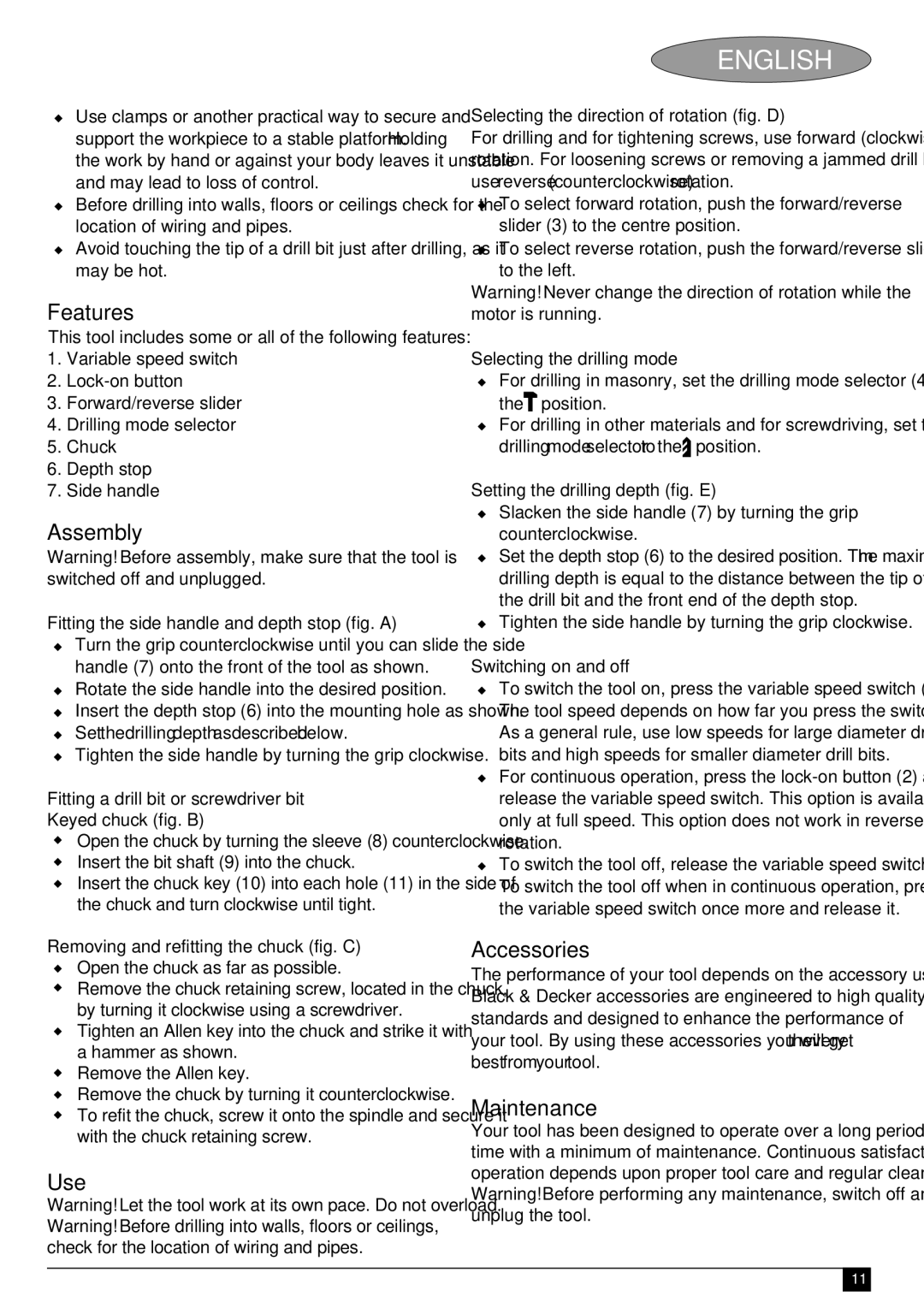
Use clamps or another practical way to secure and support the workpiece to a stable platform. Holding the work by hand or against your body leaves it unstable and may lead to loss of control.
Before drilling into walls, floors or ceilings check for the location of wiring and pipes.
Avoid touching the tip of a drill bit just after drilling, as it may be hot.
Features
This tool includes some or all of the following features:
1.Variable speed switch
2.
3.Forward/reverse slider
4.Drilling mode selector
5.Chuck
6.Depth stop
7.Side handle
Assembly
Warning! Before assembly, make sure that the tool is switched off and unplugged.
Fitting the side handle and depth stop (fig. A)
Turn the grip counterclockwise until you can slide the side handle (7) onto the front of the tool as shown.
Rotate the side handle into the desired position.
Insert the depth stop (6) into the mounting hole as shown. Set the drilling depth as described below.
Tighten the side handle by turning the grip clockwise.
Fitting a drill bit or screwdriver bit
Keyed chuck (fig. B)
Open the chuck by turning the sleeve (8) counterclockwise. Insert the bit shaft (9) into the chuck.
Insert the chuck key (10) into each hole (11) in the side of the chuck and turn clockwise until tight.
Removing and refitting the chuck (fig. C)
Open the chuck as far as possible.
Remove the chuck retaining screw, located in the chuck, by turning it clockwise using a screwdriver.
Tighten an Allen key into the chuck and strike it with a hammer as shown.
Remove the Allen key.
Remove the chuck by turning it counterclockwise.
To refit the chuck, screw it onto the spindle and secure it with the chuck retaining screw.
Use
Warning! Let the tool work at its own pace. Do not overload. Warning! Before drilling into walls, floors or ceilings, check for the location of wiring and pipes.
ENGLISH
Selecting the direction of rotation (fig. D)
For drilling and for tightening screws, use forward (clockwise) rotation. For loosening screws or removing a jammed drill bit, use reverse (counterclockwise) rotation.
To select forward rotation, push the forward/reverse slider (3) to the centre position.
To select reverse rotation, push the forward/reverse slider to the left.
Warning! Never change the direction of rotation while the motor is running.
Selecting the drilling mode
For drilling in masonry, set the drilling mode selector (4) to the ![]() position.
position.
For drilling in other materials and for screwdriving, set the drilling mode selector to the ![]() position.
position.
Setting the drilling depth (fig. E)
Slacken the side handle (7) by turning the grip counterclockwise.
Set the depth stop (6) to the desired position. The maximum drilling depth is equal to the distance between the tip of the drill bit and the front end of the depth stop.
Tighten the side handle by turning the grip clockwise.
Switching on and off
To switch the tool on, press the variable speed switch (1). The tool speed depends on how far you press the switch. As a general rule, use low speeds for large diameter drill bits and high speeds for smaller diameter drill bits.
For continuous operation, press the
To switch the tool off, release the variable speed switch. To switch the tool off when in continuous operation, press the variable speed switch once more and release it.
Accessories
The performance of your tool depends on the accessory used. Black & Decker accessories are engineered to high quality standards and designed to enhance the performance of your tool. By using these accessories you will get the very best from your tool.
Maintenance
Your tool has been designed to operate over a long period of time with a minimum of maintenance. Continuous satisfactory operation depends upon proper tool care and regular cleaning. Warning! Before performing any maintenance, switch off and unplug the tool.
11
